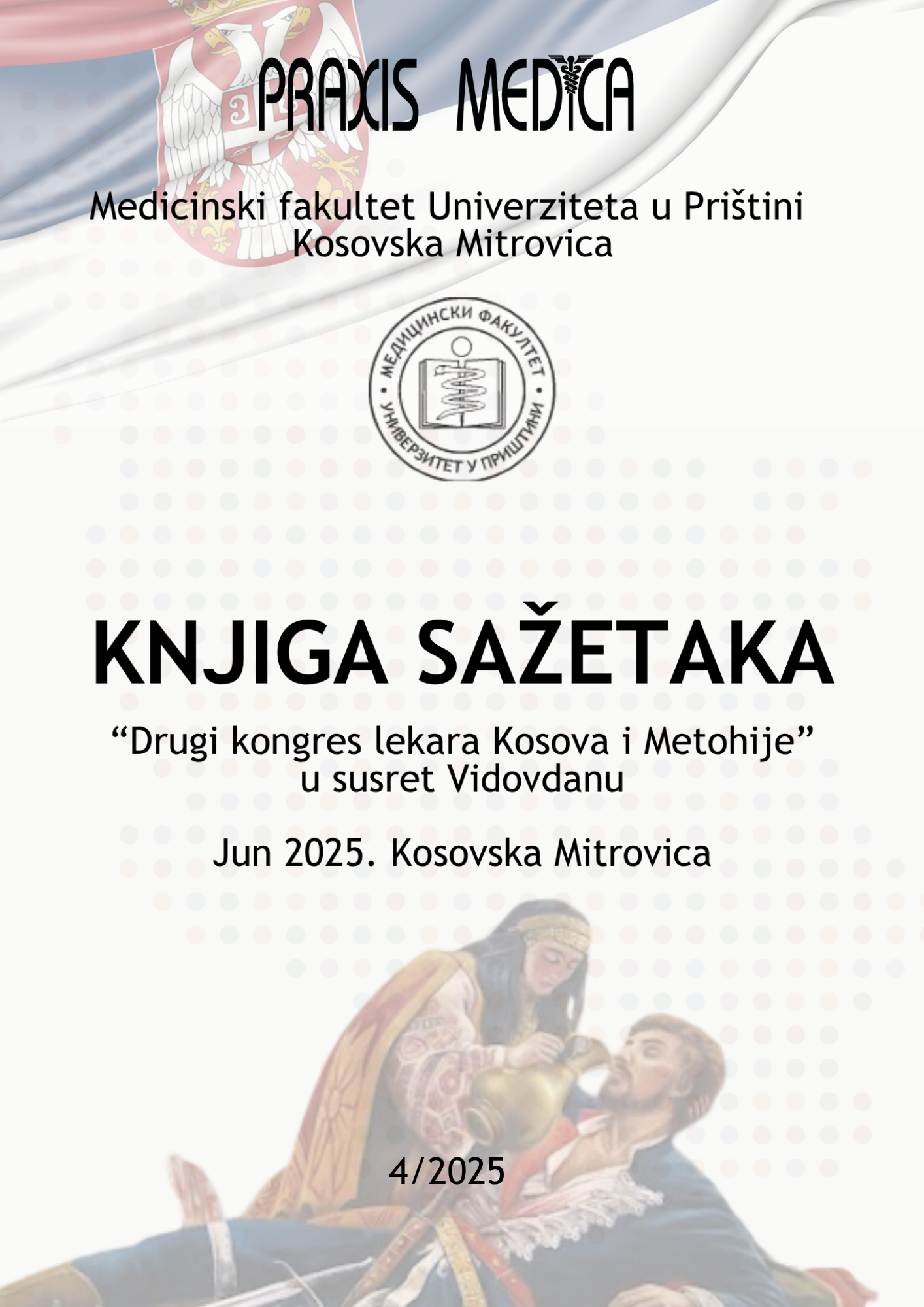Current issue

Volume 53, Issue 4, 2025
Online ISSN: 2560-3310
ISSN: 0350-8773
Volume 53 , Issue 4, (2025)
Published: 30.06.2025.
Open Access
All issues
Contents
15.02.2025.
Case Reports
IDIOPATHIC PULMONARY HYPERTENSION – CASE PRESENTATION
Pulmonary hypertension (PH) is a hemodynamic condition characterized by a mean pulmonary artery pressure (mPAP) ≥ 25 mmHg at rest, pulmonary arterial wedge pressure (PAWP) ≤ 15 mmHg, and pulmonary vascular resistance (PVR) > 240 dyn·s·cm⁻⁵. The annual incidence of pulmonary arterial hypertension (PAH) is approximately 3–10 new cases per million adults. It is estimated that the prevalence of pulmonary hypertension in individuals over 65 years of age is around 10%.The aim of this study is to present the case of a female patient with progressive dyspnea in whom PAH remained undiagnosed for a prolonged period.A 74-year-old female patient, M.P., was hospitalized in the Coronary Care Unit of the Clinical Center in Kosovska Mitrovica due to symptoms of shortness of breath, choking, fatigue, leg swelling, and weakness. The admission ECG revealed: sinus rhythm, normal axis, high R wave in V2, ST depression, and negative T waves in leads II, III, aVF, and V4–V5. Echocardiography findings showed right ventricular enlargement (2.9 cm), pulmonary artery dilation (3.3 cm), 1–2+ pulmonary regurgitation, and 3+ tricuspid regurgitation, with a systolic pulmonary artery pressure (SPAP) of up to 126 mmHg. The right ventricle measured 5.3 cm in the 4Ch view, with a TAPSE of 1.8 cm. Right heart catheterization revealed the following pressures: PA 78/34/57 mmHg, RV 74/8/10 mmHg, RA 6/6/7 mmHg, CO 4.3 l/min, and LV 99/10/8 mmHg. Although primary pulmonary hypertension is predominantly a disease of younger individuals, it should also be considered in older patients presenting with progressive dyspnea in the absence of structural heart disease.
Kristina Bulatović, Vladan Perić, Maja Šipić, Jovana Milošević, Erdin Mehmedi, Sanja Jovanović
01.12.2021.
Professional paper
Students' attitudes about the quality and effectiveness of online compared to traditional teaching of histology and embryology during the COVID-19 pandemic
INTRODUCTION: The corona virus desease has led to numerous changes in all aspects of our lives. The educational system through numerous innovative learning methods managed the smooth conduct of distance learning. OBJECTIVE: The aim of our study is to examine the attitudes of medical and dental students about quality and effectiveness of online versus traditional teaching, in the course of Hystology and Embriology during the duration of the COVID-19 pandemic. METHODS: The research was conducted online, with the help of a questionnaire designed on the Google Forms platform. The cross-sectional study included second-year students of medicine and dentistry at the Faculty of Medicine in Priština -Kosovska Mitrovica, who during the 2020/21 academic year followed online and classical classes in the subject Histology and Embryology. The results were processed using descriptive statistical methods and appropriate tests for testing the hypothesis about the significance of the difference between two, three or more samples. RESULTS: Out of the total number of surveyed students (n=60), 95% of students attended traditional classes, 88.3% of students attended classes via Zoom platform, while 85% of respondents used Moodle platform. The highest percentage of very satisfied (38.3%) and satisfied (51.6%) students was with traditional teaching. The percentage of available lecturers during online classes is 73.3%, and 76.7% during tradicional teaching. 75% of students believe that tradicional teaching can not be replaced by online teaching method. 68% of students used the literature and available presentations on the Moodle platform to prepare for the exam. A significant correlation was found in the case of satisfaction with the grade and the achieved success in the exam (p=0,001). CONCLUSION: The results of our research show that students preferred traditional over online teaching, which makes traditional teaching a primary and irreplaceable form of education.
Teodora Jorgaćević, Slađana Savić, Jelena Tomašević, Erdin Mehmedi, Milica Perić, Sanja Gašić





